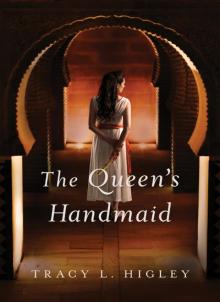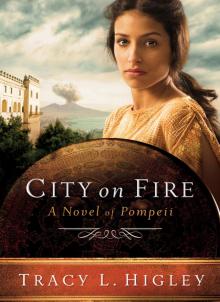- Home
- Tracy L. Higley
The Queen's Handmaid
The Queen's Handmaid Read online
Acclaim for Tracy L. Higley
City on Fire, previously released as Pompeii
“Higley’s Pompeii ignites with riveting and compelling characters. No one unleashes the secrets of history with a masterful hand the way Higley does! Authentic and powerful, [City on Fire] is a fiery tale of a city lost to the power of Vesuvius. I simply could not read fast enough!”
—RONIE KENDIG, AUTHOR OF THE
DISCARDED HEROES SERIES
“[City on Fire] is a richly detailed story of powerful redemption and raw courage. Higley takes readers right to the foot of the legendary volcano, Vesuvius, and spins her tale under the shadow of certain disaster.”
—GINGER GARRETT, AUTHOR OF
WOLVES AMONG US
“Higley brings Pompeii to life again in this exhilarating tale of love and adventure. The story was so enthralling to me—I want to read it again!”
—ELIZABETH GODDARD, AUTHOR OF
THE CAMERA NEVER LIES
So Shines the Night
“Higley proves once again that she has a great talent for historical fiction. It is easy to get lost in the ancient world with Daria during her adventures. The story is so well detailed and the struggles between different faiths and cultures is exceptionally illustrated. Daria characterizes all one would hope for in a strong, brave woman of faith.”
—ROMANTIC TIMES BOOK REVIEWS,
4-STAR REVIEW
“I love Tracy Higley’s novels. Meticulously-researched, spell-bindingly written with luscious prose and compelling and complex characters, each one is a treasure. Higley knows her history, but more importantly, she knows just how to capture the struggles and questions of the human heart—yesterday and today.”
—TOSCA LEE, NEW YORK TIMES BEST-SELLING AUTHOR OF HAVAH: THE STORY OF
EVE AND THE BOOKS OF MORTALS SERIES
Garden of Madness
“Readers will find much to enjoy here: fine writing, suspense, mystery, faith, love, and a new look at an old story.”
—PUBLISHERS WEEKLY
“The author’s insights into a woman’s inner strengths . . . will leave readers rejoicing.”
—ROMANTIC TIMES BOOK
REVIEWS, 4½ STARS, TOP PICK!
“Mystical as the Seven Wonders, exotic as the Hanging Gardens. Higley has outdone herself with this exquisite story of intrigue, elegantly told and rich with all the flavors of ancient Babylon. Simply magnificent.”
—TOSCA LEE, NEW YORK TIMES BEST-SELLING AUTHOR OF HAVAH: THE STORY OF
EVE AND THE BOOKS OF MORTALS SERIES
“Even more riveting than the historical background is the mystery that Higley creates as the backdrop to her exploration of the ancient world . . . Readers will not be satisfied until they have discovered the truth along with Tiamat.”
—DR. SHANNON ROGERS FLYNT,
ASSISTANT PROFESSOR, DEPARTMENT OF
CLASSICS, SAMFORD UNIVERSITY
Also by Tracy L. Higley
Garden of Madness
Isle of Shadows
So Shines the Night
City on Fire: A Novel of Pompeii
Pyramid of Secrets (available in e-book only)
© 2014 by Tracy Higley
All rights reserved. No portion of this book may be reproduced, stored in a retrieval system, or transmitted in any form or by any means—electronic, mechanical, photocopy, recording, scanning, or other—except for brief quotations in critical reviews or articles, without the prior written permission of the publisher.
Published in Nashville, Tennessee, by Thomas Nelson. Thomas Nelson is a registered trademark of Thomas Nelson, Inc.
Thomas Nelson, Inc., titles may be purchased in bulk for educational, business, fund-raising, or sales promotional use. For information, please e-mail [email protected].
Publisher’s Note: This novel is a work of fiction. Names, characters, places, and incidents are either products of the author’s imagination or used fictitiously. All characters are fictional, and any similarity to people living or dead is purely coincidental.
Library of Congress Cataloging-in-Publication Data
Higley, T. L.
The Queen’s handmaid / Tracy L. Higley.
pages cm.
Summary: “From the servant halls of Cleopatra; Egyptian palace to the courts of Herod the Great, Lydia will serve two queens to see prophecy fulfilled. Alexandria, Egypt, BC. Orphaned at birth, Lydia was raised as a servant in Cleopatra’s palace, working hard to please while keeping everyone at arm’s length. She’s been rejected and left with a broken heart too many times in her short life. But then her dying mentor entrusts her with secret writings of the prophet Daniel and charges her to deliver this; vital information to those watching for the promised King of Israel. Lydia must leave the nearest thing she had to family and flee to Jerusalem. Once in the Holy City, she attaches herself to the newly appointed king, Herod the Great, as handmaid to Queen Mariamme. Trapped among the scheming women of Herod; political family; his sister, his wife, and their mothers; and forced to serve in the palace to protect her treasure, Lydia must deliver the scrolls before dark forces warring against the truth destroy all hope of the coming Messiah”— Provided by publisher.
ISBN 978-1-4016-8684-0 (pbk.)
ISBN 978-1-4016-8685-7 (eBook)
1. Queens—Fiction. 2. Slaves—Fiction. 3. Egypt—Fiction. I. Title.
PS3608.I375Q44 2014
813'.6—dc23 2013037409
Printed in the United States of America
14 15 16 17 18 RRD 5 4 3 2 1
For Steve Laube
In gratitude for nearly a decade
of unwavering support,
wise guidance, and genuine friendship
Contents
One
Two
Three
Four
Five
Six
Seven
Eight
Nine
Ten
Eleven
Twelve
Thirteen
Fourteen
Fifteen
Sixteen
Seventeen
Eighteen
Nineteen
Twenty
Twenty-One
Twenty-Two
Twenty-Three
Twenty-Four
Twenty-Five
Twenty-Six
Twenty-Seven
Twenty-Eight
Twenty-Nine
Thirty
Thirty-One
Thirty-Two
Thirty-Three
Thirty-Four
Thirty-Five
Thirty-Six
Thirty-Seven
The Story Behind the Story . . . and Beyond
Reading Group Guide
Acknowledgments
About the Author
THE HASMONEAN DYNASTY
(Also known as the Maccabeans)
Not a complete family chart—only characters referenced in the book or familiar from the New Testament
HEROD’S FAMILY
Not a complete family chart—only characters referenced in the book or familiar from the New Testament
One
Alexandria, Egypt
January, 39 BC
Lydia detached herself from the surge of chaos in the palace kitchens and slipped along the shadowed corridor, to a door in the south wall where a few coins would finally find their way into her palm. If she was not caught.
The shouts had come thirty minutes earlier. The Idumean governor of the north-country province of Israel was navigating his ship into the royal port. Slaves assigned to watch the darkening harbor scuttled back to the palace.
In the kitchens, Banafrit was barking commands at her frantic staff,
her voice a whip-crack over slaves and servants alike who scurried to do her bidding. But Lydia’s presence was neither needed nor expected there, and her secret errand would not wait. She risked a beating, or worse, but it was not the first time.
From somewhere in the cavernous palace came a haunting melody plucked on lyre strings, but the gray walls of the darkened corridor tunneled away from the sound to the south wall. Lydia sped forward on sure feet, sandals scuffing the stone floors. She could navigate these halls in darkness, and often did, to be alone with her thoughts.
The blue glaze of the jug she carried was smooth, but her fingers instinctively sought out imperfections, any trapped air or roughened clay that would render the piece less valued. A figure in the narrow doorway ahead shifted, the moonlight outlining wide shoulders and brawny arms.
At his sudden appearance, her back stiffened.
“You are late.” He spoke in a whisper. The light behind him left his features undefined, but the voice was familiar.
In the harbor beyond, the eerie sound of a cat yowling for its next meal raised the hair on Lydia’s arms. “I had difficulty getting away. We have a guest arriving—”
“Yes, Herod. The whole city is aware. But one politicking Arab need not disrupt all of commerce!”
Lydia bit back a sharp reply. Her small jug was hardly the stuff of exotic trade. She held the piece to the moonlight. “I gave this one shaded striations of blues and grays, and you’ll see that the neck is quite delicate—”
“Girl, you know I care nothing about beauty.” He snorted. “The only beauty I know is the lovely color of the obols your pieces fetch me.” He jingled a pouch at her eye level. “Pity you can’t work faster. Your work is always in demand.”
Lydia handed him the jug and took the pouch from his outstretched hand. “Someday.” She shook the coins as he had done. “When I have saved enough of this.”
Though at the pace she found time to make pieces, she would be older than Banafrit by the time she broke free of palace service to open her own shop. If she survived that long. “Someday.”
He shrugged and disappeared into the night with a disinterested wave and a muttered, “Until next week.”
Lydia’s free hand lifted of its own accord, as if to bid farewell to the jug that was a part of her, as all her artwork became.
She turned back into the corridor, and a flutter of white caught her eye. Her pulse jumped. “Who is there?”
Silence met her question. She tucked the money pouch with its scant obols under the folds of her outer robes and hurried forward, sliding her fingers along the length of the damp wall. Around the first corner a smoldering torch painted the corridor in a smoky half-light. Her quarry vanished around the next bend, but not before the jade-green robes and pale flesh had given her away. Andromeda.
Had the girl been watching? Seen the transaction in the shadows? Lydia paused in the hall, one hand braced against the wall and the other clutching the meager pouch. Cleopatra’s anger knew no limits and was as unpredictable as summer lightning.
The scent of smoke watered Lydia’s eyes and a chill breeze snaked through the hall and sputtered the torch, mimicking the beat of her heart. She swallowed against a bitter taste. She was so close to her goal of six hundred obols. She needed only to keep her head down and stay safe from Cleopatra’s wrath until she earned a bit more. But if Cleopatra found out . . .
She would not follow Andromeda. Better to tuck the pouch’s dismal contents into the carefully concealed pocket of her sleeping mat, in the lower level of the palace she shared with two other servants, than to try to figure out the girl’s plan. Lydia passed the smoking torch, rounded the corner hesitantly, but Andromeda was already gone, off to spread gossip, no doubt. The girl was younger even than Lydia, perhaps only fifteen years old, but never missed a chance to outshine her. Lydia escaped to her bedchamber, secreted away the coins in the straw, and hurried to the kitchens to assess the damage.
The palace kitchens bordered a spacious atrium with a central impluvium beneath the open sky catching rainwater. Tonight, at the four corners of the impluvium, four large bronze pots were suspended by chains over cook fires. The overflowing pots pitched and heaved like ships on tempestuous waves of fire. Heat radiated through the courtyard, barely escaping into the night air. No expense, no effort would be spared to impress Herod. Cleopatra had made her desires clear.
Around the fires, palace staff stumbled, shoved, and shouted. The raised arms of pretty serving girls rushed past with platters of delicacies, and new-muscled boys shouldered amphorae of wine in a parade of luxury marching toward the spread tables.
Lydia weaved through the bedlam to the huge kitchen off the atrium, following the sound of Banafrit’s roar of impatience.
“What do I care about such nonsense tonight, girl?”
Lydia hesitated in the doorway, jaw tightening. Andromeda had already found her way to Banafrit, to pour her poison into the woman’s ear and try to curry favor. But Banafrit elbowed the girl away, bustling around a table littered with the remains of radish and carrot tips and greens and scowling at the noisy kitchen staff all at once.
The woman’s gray-streaked hair was struggling free of its combs, and in the fire-heat, strands plastered her pink cheeks. Flour coated her left eyebrow, and she wiped the back of her hand across her forehead, the tan smudge like a scar.
Blustering as she was, Banafrit was the closest thing to a mother Lydia had ever known, though Lydia would never admit to the woman that she had constructed the role for her. Lydia belonged nowhere, but at least in this kitchen, she was acknowledged.
The older woman eyed Lydia in the door frame, glanced from her to Andromeda, and scowled once more. The younger girl seemed to understand where Banafrit’s loyalty lay and slunk off to complain to a servant boy who was always hanging about her.
But it was another who greeted her, rising unsteadily from a chair against the wall. “Lydia, at last.” He ringed a table of servants arranging pale-green melons on platters and came forward to greet her.
“Samuel.” She held out welcoming hands to her friend. The aging man’s usually laugh-crinkled face was somber, his white beard uncombed. “What brings you to the palace on a night such as this?”
“I—I need to speak with you—”
Banafrit waddled between them and swatted at Samuel in a familiar gesture born of years of acquaintance. “Be gone, old man. We’ve no time for lessons and studies here tonight. Herod will be wanting his food and his comforts, and we’ve nothing but slow-witted servants and lazy slaves about.”
She cast an evil eye over Lydia, though a fondness lay behind her expression. “And you—why is it everyone wants to speak about you, to you? Haven’t you duties of your own tonight? I should think that brat—”
“Cleopatra is readying her son herself this evening.” Lydia idly rearranged some pomegranates and green grapes on one of the serving dishes into a more pleasing display, with complementary colors better balanced. “She wanted to remind him of the proper manners before a Jewish Galilean governor.”
Samuel grunted. “He’s not Jewish. And as for proper manners . . .” He left off, with a glance at the ceiling and a shrug.
Samuel’s hostility ran deep. Although he had been born in Susa, in what had once been the Persian Empire, he was intensely loyal to all of Israel, from whence his people had been exiled centuries ago. And Lydia was equally loyal to him. If Banafrit was mother, then Samuel was father. Though it was best to remain independent, to keep some distance. A battle Lydia continually fought.
“Banafrit is right, Samuel. I should make myself available for whatever is needed tonight. Our lessons must wait.”
“Hmph, lessons.” Banafrit poked a servant girl and handed her the fruit platter. “Why you want to learn to be Jewish from this man, I’ll never understand. You’re not even a Jew.”
Lydia raised her eyebrows. “How do you know?”
Banafrit’s glance flicked to Samuel, then away, as t
hough the two held a confidence between them. “I told you I’ve no time for chatter.”
But Samuel grabbed her hands, dwarfing them in his own large grasp. “No lessons tonight, Lydia. There is something important I need to tell you. Something has happened—”
“Ly—di—a!” The screech echoed through the kitchen chamber, familiar enough to freeze every servant and slave at his task.
Cleopatra sailed into the kitchen, raven hair unbound and streaming, dressed only in a white sheath. Her dark eyes were wild with anger or excitement, perhaps both. “There you are! I have been calling for you all over the palace like a peasant woman chasing down a wayward husband! I need you at once. Caesarion has hurt himself, and I am not even close to being ready to meet Herod.” She gave a glance to Samuel, his hands still wrapped around Lydia’s, and frowned. Then she spun and departed, her expectation clear that Lydia would follow on her heels.
Lydia tried to pull her hands from Samuel’s grasp, but he held firm. “Not yet, child. I have something vital I must tell you. Something of your future—something that is past the time for telling.”
Banafrit’s never-ceasing activity stilled.
Lydia bit her lip at the intensity in his eyes. “What do you mean, past the time—?”
“Ly—di—a!”
She snatched her hands from his. “I must go, friend. I will find you later.” She fled the kitchen, but his declaration thudded inside her mind like an omen of destiny. Her future. And perhaps her past? She wanted to reach back for the knowledge, but it was like grasping at a wave and finding only sea spray. When would she have another chance? The deep ache, with her always and all the more these past months, swelled against her chest, full and yet desolate.
She shook her head against the emotion and crossed the flame-lit kitchen courtyard. Her mistress was already gone. She hurried down the front hall of the palace, up the massive stairs, to the chamber suite of Cleopatra Philopator, reincarnation of Isis, Pharaoh of Egypt.
The white-kilted Egyptian guard nodded at her approach.

 The Queen's Handmaid
The Queen's Handmaid Keeper of the Flame
Keeper of the Flame Palace of Darkness
Palace of Darkness City on Fire
City on Fire